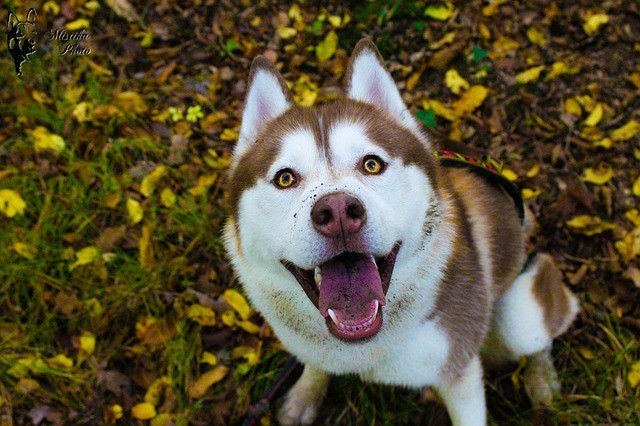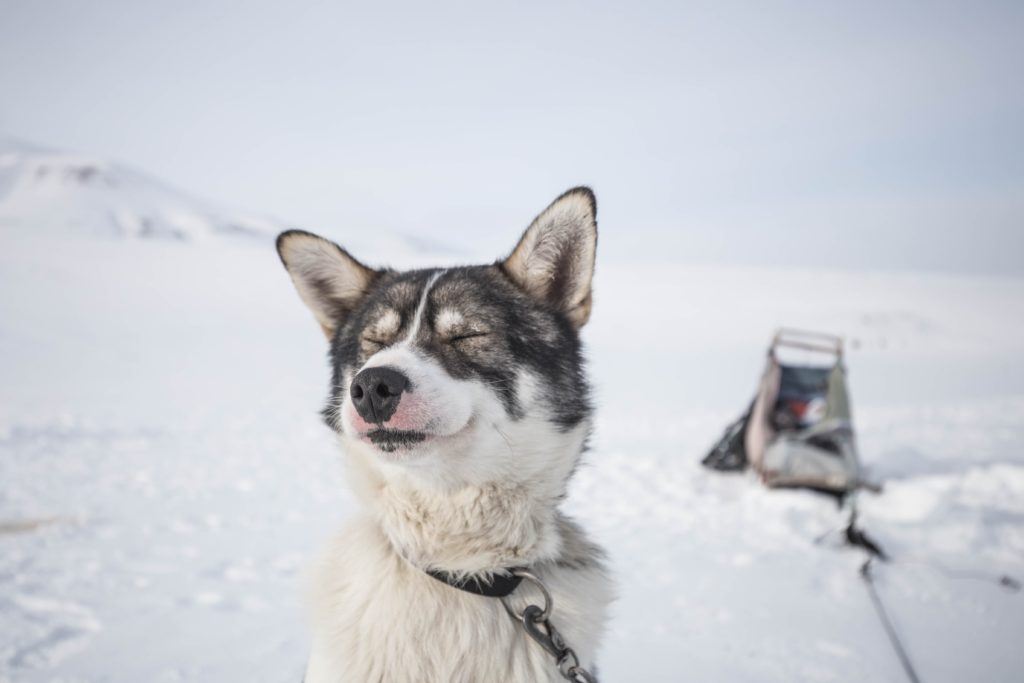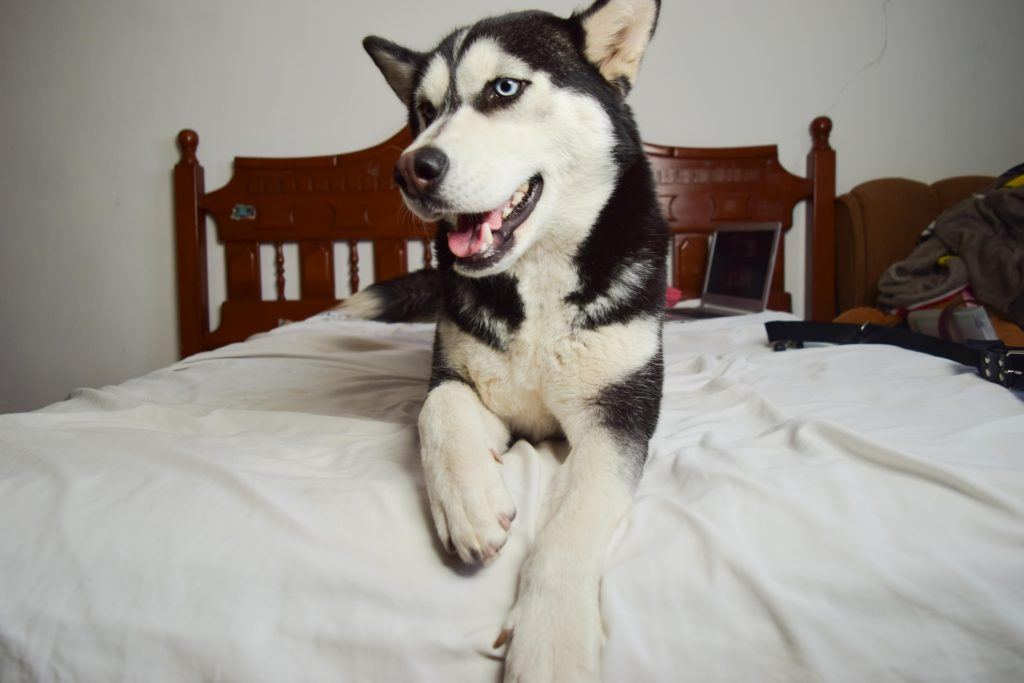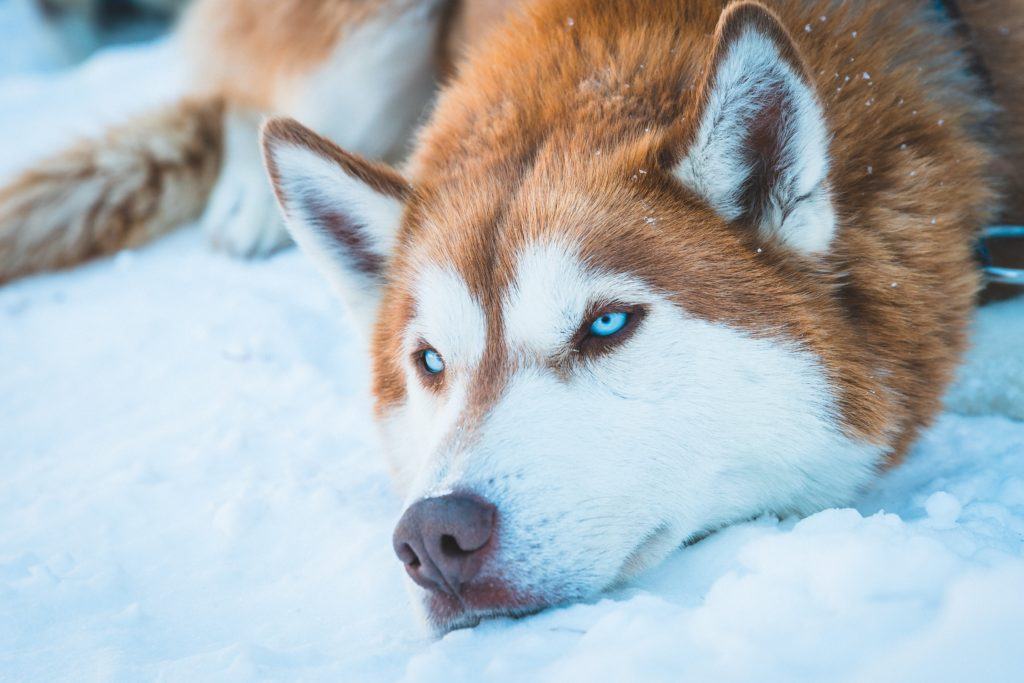Wondering if your husky is too heavy, or too thin?
This guide to husky weight will fill you in on the potential risks to your dog’s health while helping you to identify signs of Husky obesity.
By the time you’re done, you’ll be able to easily guarantee that your furry friend remains at the average Husky weight for an energetic, well-adjusted life.
What Should A Husky Weigh?
Huskies have a life expectancy of between eleven and thirteen years when taken care of responsibly.
While Huskies are a very energetic breed, they do have the potential to become pillow princes if spoiled.
An adult, male Husky should weight in between 35 and 60 lbs. Females, comparatively, should weigh between 35 and 50 lbs.
See the key differences: male vs female huskies.

You’ll note that full grown husky weight varies. If you notice your dog gaining weight, then make sure to consult both these presented ranges and a husky weight chart before you start worrying about if your dog has gained too many pounds.
If you happen to bring home a miniature Husky, you’ll want to address the kind of cross-breeding that has resulted in your smaller-than-average dog.
Miniature huskies (like all mixes) are created by pairing husky genetics with those of smaller dogs, and these breeds will weigh between ten and twenty pounds.
But what about the puppies?
Newborn huskies typically weigh in at between seven and ten pounds. On average, it’ll take these puppies nine months to mature and reach their natural height and weight.
Nine months isn’t all that long when you consider the average lifespan of the breed, and it takes careful monitoring of your dog’s diet and health in order to ensure that they remain at their ideal weight for as long as possible.
Here’s a useful husky weight chart at various ages – handy for tracking the growth of your dog!
Managing Husky Weight
Weight trouble with any breed of dog is easiest to identify when the dog in question is overweight.
We, as pet owners, have been trained to notice when our dogs are getting a little pudgy around the middle, as opposed to when our pups are getting too thin. This guide will address how best to keep your dog from becoming overweight, as well as underweight.
When Is A Husky Obese?
All breeds of dog are considered overweight when they weigh about twenty percent more than their ideal body weight indicates they should. In the case of the husky, this means weighing seventy-two pounds or more.
A husky is said to be obese when their body weight is thirty percent higher than their weight range indicates.
An obese husky, then, would weigh in at around seventy-eight pounds or more.
The difference between an overweight dog and an obese dog may seem negligible, but these few pounds can have a significant impact on their overall health.
Helping your husky to drop the extra weight will help them live longer.
See more: How long do huskies live?
Causes of Husky Obesity
While there are a few disorders that may result in your husky gaining weight, you need to remember that it’s you who’s in charge of your dog’s meals.
That’s not to say your pup can’t break into your cabinets in order to get themselves a treat. Most of the time, however, husky obesity can be best treated by a change in your own behavior.

Overfeeding
It’s possible that you may be overfeeding your Husky.
We’ve all been manipulated by our dogs when they try to beg for food, so don’t feel too bad about the extra treats you’ve slipped them now and then.
What you need to do, however, is acknowledge that while your dog thinks they know what’s best for them (tasty treats) it’s your responsibility, like a parent, to maintain or enforce what they actually need, as opposed to what they want.
Diabetes
On a medical note, your dog may have a great deal of trouble processing insulin, and thereby may have diabetes.
In some cases, a dog with undiagnosed and untreated diabetes may gain a significant amount of weight.
If you haven’t changed the way you’ve been feeding them, but you still notice they’re packing on the pounds, you may want to take them to the vet. It’s possible the weight they’re gaining is the result of a medical condition.
How to Help A Husky Lose Weight
“How do I help my Husky lose weight?” you may ask yourself.
Beyond meal management, there are a few tricks you can leverage to assist your Husky in maintaining a more balanced diet.
Measure Meals
The simplest fixes are often the best. You can start by measuring out your husky’s meals into more accurate doses.
Place a one-cup scoop into your dog’s kibble bag and establish a base amount that’s healthy to feed them on a day-to-day basis.
Mark down the amount you give your dog every time you feed them. They may resent you at first, but soon, you’ll have them used to a more controlled diet.
Introduce Veggies as Treats
Huskies are able to eat broccoli, zucchini, cauliflower, carrots, green beans, and a number of other vegetables. Some even like these foods more than actual dog treats.
Experiment (safely) with your dog and the food you find in your own fridge. You may be able to choose a healthier alternative that helps your pup lose weight naturally.
Here’s a video showing an example of vegetable dog treats for huskies.
Daily Exercise
It’s also been noted that huskies are an extremely active breed of dog.
For a husky, exercise is vital.
They were built to pull sleds and to run; ergo, it’s important, when working to maintain a husky’s health, that they receive a lot of exercises.
See more: how fast can a husky run?
Let your dog try out dry sled pulling, or take them on at least three short walks a day.
This may seem like high-maintenance care, but ensuring that your husky can wear themselves out by the end of the day will not only help the both of you sleep through the night, but it will keep their weight in check and their overall demeanor happier.
Change Food Brands
There are also some brands of dog food available that are ideal for helping your husky lose weight.
Some ideal brands of dog food have an average amount of protein in them but are low on carbs and lower than average on calories.
These sorts of foods are advertised as lean, grain-free, reduced in fat, or holistic. Make sure you do your research before you change dog food brands, though.
Each dog’s needs are individualized, no matter the breed, and potential allergies are worth keeping an eye on.
See more: the best dog food for huskies.
Unexpected Husky Weight Loss
On the other end of the spectrum, if you notice that your husky seems to be lacking in energy, has a less-than-shining coat, or has begun showing a noted disinterest in their food, you may have a case of unexpected husky weight loss on your hands.
“Why is my dog losing weight?” you may ask, trying to ply your furry friend with all sorts of good food.
Like with husky obesity, there can be medical issues that result in your husky losing weight. In this case, though, it’s far more likely that the cause of your husky’s weight loss will be biological as opposed to situational.
Undernourishment
Let’s say that you drive past a dog every day on your way to work. You notice, over the course of several weeks, that the dog looks like it’s lost a good chunk of its body weight, that its coat looks shabby, or that it seems to be constantly going to the bathroom.

This hypothetical situation presents a case of dog undernourishment. When a dog, husky or otherwise, doesn’t receive enough food or the right kind of care, they can lose up to ten percent of their body weight.
Undernourishment, it should be noted, is not the same thing as poor nutrition. Your dog may be receiving enough food on a daily basis without getting all of the vitamins and minerals they need.
A dog is only malnourished when a notable decline in health and weight occurs – poor nutrition, that is to say, is a much easier condition to attend to.
Diabetes
Once again, your dog’s ability to process insulin may have a direct impact on their weight.
If you notice, once your dog passes the nine-month mark, that they have a difficult time putting on or keeping on weight, this loss may be the result of their inability to process the sugars in their food.
It is true that dogs that are obese are more likely to develop diabetes, but you can never know what kind of conditions pass from mother to puppy without consulting your local veterinarian.
Anxiety
Your dog may also be losing weight as a result of their anxiety.
Anxiety appears in dogs when they’re uncomfortable with their environment, and it’s often signalled by uncontrollable peeing, barking, excessive howling, or the destruction of any obstacles around them.

Dogs who experience anxiety may also try to run away from home.
If you notice that your dog not only refuses to eat, but shies away from your touch, behaves submissively, and frequently seems afraid, then you may want to consult a vet in order to prescribe your furry friend with anti-anxiety medication.
In the meantime, you’ll want to do everything you can to make your dog as comfortable as possible, thereby encouraging them to eat.
This is one case of weight loss that absolutely, without question, requires the attention of a vet, because anxiety is such a difficult condition to diagnose.
Tapeworms or Parasites
Finally, your husky may be losing weight because they’ve contracted a tapeworm or other, similar parasite.
Tapeworms are parasites that live in your dog’s intestines. These creatures will eat all of the food that your dog consumes before your dog’s body has time to process the food’s nutrients.
Symptoms of tapeworms and similar parasites include rapid and sudden weight loss, as well as excessive hunger and thirst.

In many of these cases, be they signs of obesity or poor nutrition, you’ll want to reach out to a vet in order to get a professional opinion on your husky’s weight.
On a day-to-day basis, though, the management of your husky’s weight can be as simple as managing their meals more closely.
By ensuring that your husky receives no more and no less than the ideal amount of food, you can guarantee them a happier and healthier life.
Do you have any tips for managing Husky weight?
